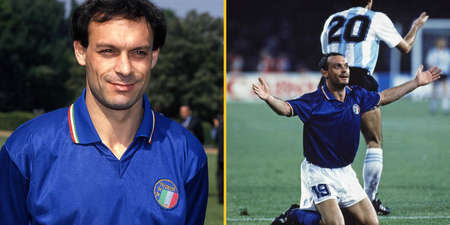Is a volley a volley if it’s not really a volley?
But what is a volley?
Jamie Vardy scored an absolute peach against Liverpool on Tuesday night with the first of his two goals. Riyad Mahrez sent him away in behind with a classic Leicester attack over the top. The ball spun back as it bounced in front of the striker so, without hesitation, Vardy lashed at it first time and it was glorious.
It wasn’t enjoyed for long though. We had to dissect it.
Some called it a volley, a beautiful volley. Others scowled and clarified it as a half-volley, a beautiful half-volley. The only thing anyone was in agreement with was the fact that it was beautiful.
As you can imagine, it got pretty heated.
Here’s the problem and here’s why Michael Cox could be right. Neither definition of a volley or a half-volley lends itself particularly to what Vardy did.
A half-volley, therefore, would be struck like a drop-kick. It would be struck like Tony Yeboah did against Wimbledon in 1995.
Fine.
But the same Oxford Dictionary doesn’t clear it up. It almost contradicts itself with its definition of a volley:
‘A strike or kick of the ball made before it touches the ground.’
If you’re willing to accept that a half-volley is only when the ball is struck immediately after it bounces (as soon as it rises), then you’re snookered with something like Vardy’s which was kicked a full second after the ball bounced because it isn’t a volley either. After all, according to Oxford too, a volley is struck before the ball touches the ground.
Paul Scholes could show you.
So, by definition, an act like Vardy’s is neither a a volley or a half-volley.
Unless… Unless.
Unless you accept that the bounce was a separate act and thus isn’t included in the definition. The volley is hitting the ball as it drops again regardless of what happened in the build-up. If it’s falling or airborne and you strike it, you’ve still volleyed it, right? It doesn’t technically matter what happened before.
That’s why Suarez’s screamer against Norwich is labelled a volley by some.
What about football purity though?
Everyone in their heart of hearts knows full well that a volley in football involves the ball never hitting the ground. It’s where “have it” comes from. It’s what ‘headers and volleys’ is built upon. It’s what makes a volley special. You can’t let a ball bounce two or three times, hit it and call it a volley. Technically, you probably could. But, culturally, you’d be expelled from the street.
In fairness though, a bouncing ball has arguably been affected as much as a controlled ball has been. Dele Alli’s ridiculous goal against Crystal Palace was special and it didn’t hit the ground. He did however have the advantage of taking two touches before he thumped it, eliminating external factors. Vardy’s meanwhile was hit first-time, probably even more difficult (the strike part) but the purist still wouldn’t call that a volley?
They probably wouldn’t. Nor should they. Difficulty levels don’t come into it.
A volley, in football, is a ball that doesn’t hit the ground. You control it yourself without the help of the surface beneath you. It all comes from you, whether you take it from the sky, whether you take two touches or whether you just have it first time.
You keep it up, you volley it, you don’t let it touch the ground before you get to it.
Technically, by definition, yes, you could argue all you want otherwise. You can argue that the act of a volley is just striking the ball in the air. But where does it end? If that goal of Suarez’ bounces three more times before he hits it, would you still call it a volley? If a cross comes across the box, bounces five times and you hit it – before it comes to rest on the ground – do you credit yourself with a volley?
You don’t.
If you live by the football rules, Vardy’s was a half-volley. It bounced and he hit it.
If you live by the half-volley rules or the Oxford Dictionary rules, Vardy’s might not have been a half-volley, it might be some other term yet to be thought up. But it sure as hell wasn’t a volley. Not in football anyway.
It was bloody magnificent all the same.















































